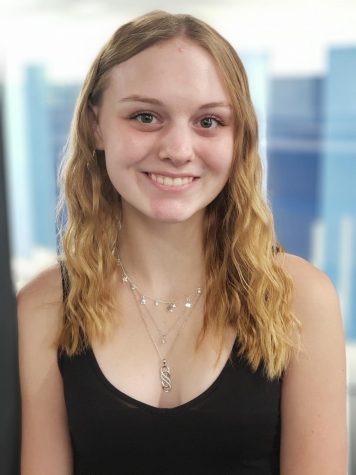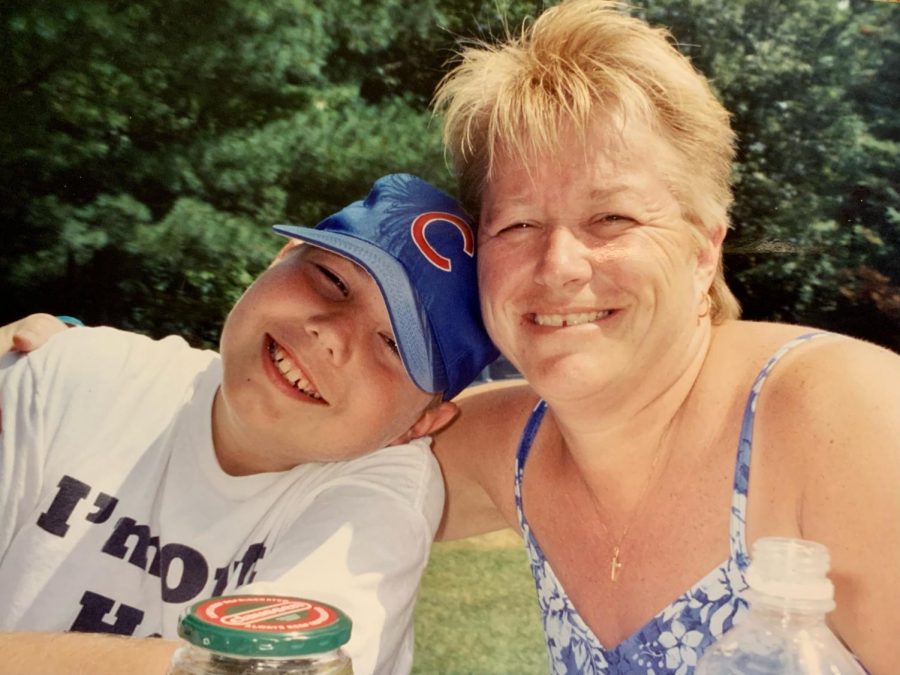Our lives, our fight
LZHS shares their experiences with cancer
Photo by and used with the permission of Dana Petraglia
Dana Petraglia, guidance administrative assistant, took a leave of absence from her job to support her son when he was diagnosed with leukemia in 2003. He is now 29 and has moved on to live his life after beating the cancer.
253. That is the number out of 334 students that have seen someone they care about get diagnosed with cancer, according to an October Bear Facts Student Media survey. And according to cancer.gov, approximately 39.5% of men and women will be diagnosed with cancer at some point during their lifetimes.When looking at these statistics it may not be difficult to realize how impactful cancer is on a larger scale, including to students and teachers.
“We were just a regular family, we did nothing wrong,” Dana Petraglia, guidance administrative assistant, said. Petraglia said it can happen to anybody, and “cancer doesn’t pick and choose who [it wants] to hurt or go to.”
The rest of the LZHS community is no exception. Three members of the school community know the terror of cancer and its effects well. They shared their story with Bear Facts Student Media to help others know exactly what cancer is like.
The Diagnosis
“The worst part was actually when the doctor called in the morning after I’d
gotten all the tests,” Courtney May, English teacher, who herself had cancer, said.
“[My doctor] said, ‘I need you to come in this afternoon.’ I had to teach the whole day knowing that I was going to be getting some very bad news after work.”
May was diagnosed in May of 2018 with ductal carcinoma. She had gone in for her first mammogram when the doctors discovered the cancerous tissue. Although she only had stage one of her cancer, she still says it was a scary moment.
“I think I was probably most scared when I was most ignorant about the process and everything,” May said. “When I first found out, I was just like, ‘I just want the surgery, I want [the cancer] out.’ My cancer surgeon had to talk me off that ledge and she was like, ‘We found some [cancer cells], let’s do a couple more biopsies and let’s make sure there isn’t anything else so we know exactly what to operate on.’ She was like, ‘This thing is not growing. You don’t need to worry about it.’”
Even the smallest bit of reassurance can help with the initial diagnosis according to May. Paige Kutsor, sophomore, was nine years old in 2014 when she found out her mom had breast cancer.
“My parents brought me and my brothers to my grandparents house, and they kind of just broke the news there,” Kutsor said. “I was really confused because I was about nine years old, but I knew what cancer was, obviously, and I remember being really worried. I cried, but [my parents] explained that it was going to be totally fine, and that was really helpful. I was definitely nervous though because I knew that she had cancer and that was a big deal, but I don’t think I understood the gravity of it.”
Her complete understanding may have been low, but she says she was still able to recognize how it was affecting her mom. Petraglia had a similar view when her son was diagnosed in 2003 at 11 years old.
“He was acting sick for two weeks after Christmas and we just thought it was the flu, but then I finally took him to the doctor because I could tell that something more than the flu that was wrong with him. And then they diagnosed him within a day or so [with] leukemia,” Petraglia said. “I was scared because it’s the unknown, you don’t know, and we just never experienced anything like it; we were very much afraid. We were at Lutheran General Hospital, so we had very good doctors that took care of him, and they started treatments right away.”
The Battle
“The hardest part for me [about knowing someone with cancer] was having a lack of knowledge about what was going on, because obviously my parents didn’t want to scare me,” Kutsor said. “They weren’t going to give me everything going on, but to this day, every once in a while my brothers will say something and I’ll find out something new that I didn’t realize.”
Despite Kutsor’s limited knowledge, she still tried to help and support through everything, including the diagnosis and the surgery to remove the tumor.
“My best way to help was just trying to understand. I didn’t know everything
going on, but I knew that it was something bad for my mom, so the biggest part was just being there for her and being present, and trying to live life as normally as I could to not stress her out or anyone else in my family,” Kutsor said. “When she got out of surgery, a lot of things were still really hard for her, so I would do her hair for her and help her with things around the house. I’d do anything like that, just as much as I could at nine years old.”
While Kutsor was a child comforting her mother, Petraglia had the reverse situation.
“I was fortunate enough to be home. I took a leave of absence from my job so I could be with [my son] all the time,” Petraglia said. “I just tried to offer him encouragement because he had a lot of anger after it was all over, and he could no longer do sports or anything like that. We’re a very close family, he has five siblings, and they’re all very supportive of him; we all just did what we could to make his life as good as we could.”
Her ability to take a break from work gave her the opportunity to never be absent throughout all the complications.
“He was a very sick, very sick little child. He went through chemo and [it]
made him very sick. His kidneys failed, he was in ICU for a while, and in the hospital a total of eight months,” Petraglia said “He missed all of fifth grade and half of sixth grade because of [the cancer]. When he came home, he had to do physical therapy because he couldn’t walk anymore and he had atrophied so badly. He had a rough time.”
Petraglia’s son went through chemo which is what made him more sick. Neither May nor Kutsor’s mom had to do chemo but May went through radiation and, like Kutsor’s mom, she also needed surgery.
“The night after the surgery, things were happening that scared me but my mom was there and she really helped out those two weeks following the surgery,” May said. “But I have a really supportive family so that helped.”
The Recovery
“Recovery has pretty much been up until now because she still takes medication to help regulate her body and her hormones and stuff like that,” Kutsor said. “Everything’s well just because I know she’s still on medication, but it was such a big shift in her life, as well as our entire family’s. Sometimes I’ll go from totally normal, and then every two weeks I’ll be like, ‘Whoa, that is something that happened to me and definitely there’s a chance again [that] my mom’s at risk.’”
According to Kutsor that worry and stress was present for both her and her mom.
“I mean she was definitely really worried about it because it was difficult to tell how bad it was going to be in the very beginning. She struggled after with feeling like she wasn’t able to do as much as she could before as she’d just gotten out of surgery, so that definitely changed,” Kutsor said. “I definitely think she feels stronger and more in control of life since she was able to beat cancer. We do a lot of stuff now, like go on runs or walks and stuff like that sometimes, but I think at first it was a struggle trying to adjust to the changes, and then having to readjust back to life.”
Petraglia also saw an emotional adjustment starting to form with her son.
“When he came back to school, he had a lot of anger issues,” Petraglia said. “He was in sixth grade by then and it was very difficult for him to go to school because he was in braces and with his legs, he just had all kinds of issues.”
Petraglia herself also had a bit of a mental adjustment at first during his remission.
“When he was done with treatment, we’d be going down to the hospital every couple of weeks,” Petraglia said. “After a while the doctors would start to be like, ‘Okay now you just need to come every three months,’ and I’d be like, ‘Are you sure?’ because I was so afraid of it coming back. After that, they were like, ‘Now you can come every six months,’ and I still was like, ‘Are you sure you don’t need to see him more?’ Overall I felt relief at the end, but still uncertain because you’re just like, ‘Are you sure he’s okay?’ It’s so hard to believe that there’s an [end].”
Despite all the hardship, Petraglia recognizes that once a cancer patient makes it through the worst part there’s still a future.
“His life right now is very good. He just made it through. He went on to school at Marquette and graduated and he’s got a really good job,” Petraglia said. “He’s getting married next spring, so he’s really in a very good place now.”
The Life Lessons
“I think I learned that you really just have to be grateful for every day that you have because tomorrow’s not promised to anybody. You see, we were just a regular family, we did nothing wrong; it just happens to everybody. Cancer doesn’t pick and choose who it wants to hurt or go to. I think the biggest thing is to just be strong, and I have a very strong faith in God,” Petraglia said. “To me that was my biggest thing, and that’s what got me through.”
Similarly to Petraglia, May felt grateful throughout her own experience.
“I learned that I can count on a lot of people. I felt very loved and supported, and I was very much appreciative of that, too,” May said. “But go to your doctor appointments and keep all your yearly appointments, there’s a reason they have those tests: to find potential problems. I have the typical lesson, but you do appreciate things a bit more because you never know when something like that can happen in your life; it made me appreciate my family, and appreciate Mr. May more because they had to give up a lot to help me through it, so I know it wasn’t easy for them either.”
Besides the gratefulness and appreciation May and Petraglia felt, Kutsor was able to see a positive change in her mom.
“I think she feels more confident, and she is a big inspiration to other people, too. I know a lot of people who’ve dealt with cancer, or are dealing with cancer, and I think she’s a big inspiration and helpful for them because she’s someone who beat it,” Kutsor said. “She has that firsthand experience, and a lot of her really good friends are people who she’s bonded with over having and beating cancer.”

Kaitlin Geisler is one of four seniors on the staff this year. It is her fourth and final year in the Bear Facts program, and her third year in the Social...


